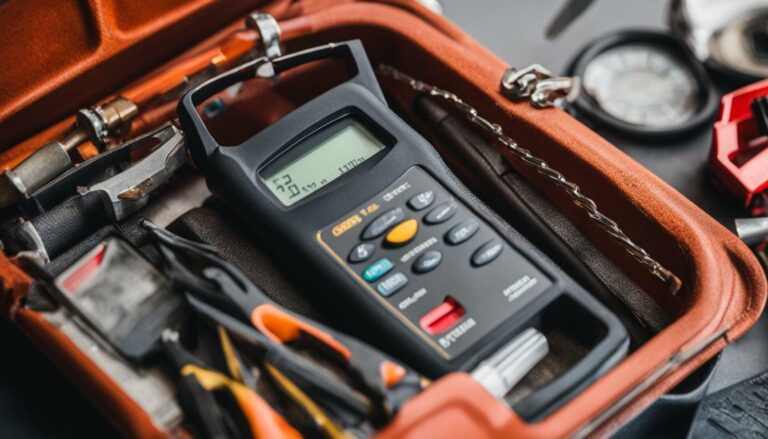Guide to Credit Repair for Those Re-entering the Workforce

If you’re re-entering the workforce and want to jumpstart your financial journey, our essential guide to credit repair is here to help.
Re-entering the workforce after a period of unemployment or job loss can be challenging, but it’s also an opportunity for a fresh start. One important aspect of rebuilding your financial foundation is repairing your credit. By addressing any credit issues and implementing effective strategies, you can improve your credit score and achieve financial stability. In this guide, we will walk you through the steps of credit repair, providing you with valuable insights and tips along the way.
Key Takeaways:
- Checking credit reports from the three major credit bureaus is crucial to understand your credit history.
- Reviewing reports for errors and disputing inaccuracies can help improve your credit score.
- Paying bills on time and prioritizing essential expenses are essential for credit repair.
- DIY credit repair empowers you to take control of your credit destiny and save money.
- Maintaining a low credit utilization rate and being cautious with new credit applications can positively impact your credit repair efforts.
Understanding Your Credit History
Before you can start rebuilding your credit, it’s essential to understand your credit history and how it affects your credit score. Your credit history is a record of your past financial activity, such as loans, credit cards, and payment history. It includes information about your credit accounts, payment history, and any negative marks like late payments or bankruptcies. Lenders and creditors use this information to evaluate your creditworthiness and determine whether to approve your applications for credit.
One of the first steps in understanding your credit history is obtaining your credit reports from the three major credit bureaus: Equifax, Experian, and TransUnion. These reports provide a detailed overview of your credit accounts, payment history, and any negative marks reported by lenders. Reviewing your credit reports regularly can help you identify any errors or inaccuracies that may be impacting your credit score negatively.
Once you have your credit reports, take the time to go through them carefully. Look for any accounts that don’t belong to you, incorrect payment information, or outdated personal information. If you find any errors or inaccuracies, you have the right to dispute them with the credit bureaus. Disputing errors and getting them corrected can potentially improve your credit score and overall creditworthiness.
🚨 TUIC Errors + Low Credit Score?
CreditScoreIQ helps you build credit faster by reporting utility bills to all 3 bureaus—while you dispute errors.
Start Building Credit Today →Understanding your credit history is a vital step in improving your credit score and rebuilding your credit. By reviewing your credit reports, identifying and disputing errors or inaccuracies, you can take control of your credit destiny and set yourself on a path towards a healthier financial future.
| Credit History Tips: |
|---|
| Obtain your credit reports from Equifax, Experian, and TransUnion |
| Carefully review your credit reports for errors or inaccuracies |
| Dispute any errors or inaccuracies with the credit bureaus |
| Monitor your credit reports regularly to stay informed about your credit history |

Before you can start rebuilding your credit, it’s essential to understand your credit history and how it affects your credit score. Your credit history is a record of your past financial activity, such as loans, credit cards, and payment history. It includes information about your credit accounts, payment history, and any negative marks like late payments or bankruptcies. Lenders and creditors use this information to evaluate your creditworthiness and determine whether to approve your applications for credit.
One of the first steps in understanding your credit history is obtaining your credit reports from the three major credit bureaus: Equifax, Experian, and TransUnion. These reports provide a detailed overview of your credit accounts, payment history, and any negative marks reported by lenders. Reviewing your credit reports regularly can help you identify any errors or inaccuracies that may be impacting your credit score negatively.
Once you have your credit reports, take the time to go through them carefully. Look for any accounts that don’t belong to you, incorrect payment information, or outdated personal information. If you find any errors or inaccuracies, you have the right to dispute them with the credit bureaus. Disputing errors and getting them corrected can potentially improve your credit score and overall creditworthiness.
Understanding your credit history is a vital step in improving your credit score and rebuilding your credit. By reviewing your credit reports, identifying and disputing errors or inaccuracies, you can take control of your credit destiny and set yourself on a path towards a healthier financial future.
Credit History Tips:
– Obtain your credit reports from Equifax, Experian, and TransUnion
– Carefully review your credit reports for errors or inaccuracies
– Dispute any errors or inaccuracies with the credit bureaus
– Monitor your credit reports regularly to stay informed about your credit history
Developing effective credit repair strategies is crucial to improving your credit score and rebuilding your financial health. When re-entering the workforce, it’s important to address any credit issues that may have arisen during your period of unemployment or job loss. By implementing the right strategies, you can take control of your credit and pave the way towards a brighter financial future.
One of the first steps in credit repair is to obtain and review your credit reports from the three major credit bureaus: Equifax, Experian, and TransUnion. These reports provide a detailed overview of your credit history and can help you identify any errors or inaccuracies that may be negatively impacting your credit score. Take the time to carefully review each report and highlight any discrepancies or issues that need to be addressed.
Once you’ve identified any errors on your credit reports, it’s important to dispute them. Contact the respective credit bureaus and provide them with the necessary documentation to support your claim. This can include copies of payment receipts, correspondence, or any other evidence that proves the inaccuracies. By disputing errors and having them removed from your credit reports, you can potentially see an improvement in your credit score.
| Key Credit Repair Tips | Explanation |
|---|---|
| 1. Pay bills on time | Consistently making payments on time is crucial for credit repair. Late payments can have a negative impact on your credit score, so be sure to prioritize paying bills by their due dates. |
| 2. Pay down credit card debt | High credit card balances can increase your credit utilization ratio, which can negatively affect your credit score. Focus on paying down your credit card debt to improve your credit utilization ratio and overall creditworthiness. |
| 3. Think before applying for new credit | Every time you apply for new credit, it can result in a hard inquiry on your credit report. Multiple hard inquiries within a short period of time can lower your credit score. Before applying for new credit, consider if it is necessary and if you can manage the additional debt responsibly. |
By following these credit repair strategies and tips, you can take charge of your credit repair journey and lay the foundation for a healthier financial future. Remember that credit repair takes time and patience, but with consistent effort, you can rebuild your credit and achieve your financial goals.

Don’t let your past hold you back – with DIY credit repair, you can take control of your credit destiny and pave the way for future opportunities. If you’re re-entering the workforce after a period of unemployment or job loss, rebuilding your credit is an essential step towards achieving financial stability. By implementing effective credit repair strategies and staying proactive, you can improve your creditworthiness and open doors to better job prospects and financial options.
One of the first steps in DIY credit repair is to obtain and review your credit reports from the three major credit bureaus – Experian, Equifax, and TransUnion. These reports provide a comprehensive overview of your credit history, including any negative marks or errors that may be dragging down your credit score. Review your reports carefully for any inaccuracies or discrepancies, and if you find any, take immediate action to dispute them. Correcting these errors can have a positive impact on your credit score and overall creditworthiness.

Consistently making payments on time is another crucial aspect of DIY credit repair. Late payments can have a detrimental effect on your credit score and financial standing. Create a payment schedule and prioritize essential expenses to ensure that you meet all your financial obligations promptly. By demonstrating responsible payment behavior, you can gradually rebuild your credit and show potential employers and lenders that you are reliable and trustworthy.
Table 1: Credit Repair Strategies
| Strategies | Benefits |
|---|---|
| Pay bills on time | Improves credit score, demonstrates financial responsibility |
| Pay down credit card debt | Lowers credit utilization ratio, boosts creditworthiness |
| Think before applying for new credit | Prevents unnecessary inquiries, avoids potential rejections |
In addition to timely payments, paying down credit card debt can significantly improve your credit utilization ratio – the amount of credit you are using compared to your total available credit. Aim to keep your credit utilization rate below 30%, as a lower ratio indicates responsible credit management. By reducing your credit card balances, you can boost your creditworthiness and increase your chances of obtaining favorable credit terms.
Finally, it’s important to think carefully before applying for new credit. Each time you apply for credit, it results in a hard inquiry on your credit report, which can temporarily lower your credit score. Be selective in your applications and only apply for credit when necessary. By being cautious and strategic with your credit applications, you can minimize the potential negative impact on your credit score and preserve your creditworthiness.
Take control of your credit destiny today with DIY credit repair. By implementing these strategies, you can start rebuilding your credit and create a solid foundation for future financial success. Don’t let past setbacks define your future – with determination and perseverance, you can overcome credit challenges and open doors to new opportunities.
Paying Bills on Time and Prioritizing Expenses
Making timely bill payments and prioritizing essential expenses are key factors in repairing your credit and regaining financial stability. Staying on top of your bills ensures that you maintain a positive payment history, which is crucial for improving your credit score. When you pay your bills on time, it demonstrates your reliability and responsibility to potential lenders and creditors.
| Benefits of Paying Bills on Time | Tips for Prioritizing Expenses |
|---|---|
|
|
“Paying your bills on time is an essential step in rebuilding your credit. It shows creditors that you are committed to meeting your financial obligations and can be trusted with new credit opportunities.”
Remember, paying your bills on time does not just impact your credit score, but it also plays a significant role in your financial well-being. By prioritizing essential expenses and making timely payments, you can regain control of your finances and work towards a brighter financial future.
Image:

Maintaining Low Credit Utilization and Smart Credit Applications
Maintaining a low credit utilization rate and making smart credit applications can significantly contribute to your credit repair journey. Your credit utilization rate is the percentage of your available credit that you are using at any given time. It is essential to keep this rate as low as possible. When lenders see that you are responsibly managing your credit by using only a small portion of your available credit, it shows them that you are a reliable borrower.
One way to lower your credit utilization rate is by paying down your credit card balances. Focus on paying off high-interest cards first and then work towards paying off other balances. This will not only reduce your credit utilization ratio but also save you money on interest charges.
Another crucial aspect of credit repair is being cautious when applying for new credit. Each time you apply for credit, it results in a hard inquiry on your credit report, which can temporarily lower your credit score. Multiple hard inquiries within a short period can raise red flags for lenders and make them question your creditworthiness.
Summary:
- Maintaining a low credit utilization rate is important for credit repair.
- Paying down credit card balances helps reduce the credit utilization ratio.
- Being cautious with new credit applications can prevent multiple hard inquiries.
By following these strategies, you can take control of your credit repair journey and work towards improving your credit score. Remember, rebuilding your credit takes time and patience, but with discipline and the right strategies, you can achieve your financial goals.
| Key Points: | Benefits: |
|---|---|
| Maintaining low credit utilization | Shows responsible credit management |
| Paying down credit card balances | Reduces credit utilization ratio and saves money on interest |
| Being cautious with new credit applications | Avoids multiple hard inquiries and maintains creditworthiness |
It’s important to remember that maintaining low credit utilization and making smart credit applications are just a couple of steps in the credit repair process. Be sure to check your credit reports for errors, dispute any inaccuracies, and consistently make payments on time. By taking control of your credit destiny, you can pave the way for a brighter financial future.

By following the steps outlined in this guide, you can confidently rebuild your credit, overcome the challenges of re-entering the workforce, and embark on a journey towards financial success. Understanding your credit history is crucial in improving your credit score. Make sure to obtain and review credit reports from the three major credit bureaus, and take the necessary steps to dispute any errors or inaccuracies that you find.
Developing credit repair strategies is equally important. Consistently making payments on time, prioritizing essential expenses, and paying down credit card debt are key components of a successful credit repair plan. Additionally, it’s essential to think carefully before applying for new credit, as multiple credit inquiries can have a negative impact on your credit score.
DIY credit repair can save you money and put you in control of your credit destiny. Take advantage of resources and tools available to assist you in the process of disputing inaccuracies and improving your credit score. Remember to maintain a low credit utilization rate, as this can positively impact your credit repair efforts. Be cautious with applying for new credit and consider the potential consequences before taking on additional financial obligations.
By paying your bills on time and prioritizing important expenses, you demonstrate financial responsibility and improve your creditworthiness. These actions not only contribute to your credit repair efforts but also set the foundation for long-term financial stability. With perseverance and discipline, you can rebuild your credit after job loss and create a solid financial future for yourself.
FAQ
Q: How can credit repair help individuals re-entering the workforce?
A: Credit repair can help individuals re-entering the workforce by providing them with a fresh start in their financial journey. By improving their credit score, individuals can gain access to better job opportunities, secure loans or credit, and demonstrate their financial responsibility to potential employers or landlords.
Q: How can I obtain and review my credit reports?
A: You can obtain your credit reports from the three major credit bureaus – Experian, Equifax, and TransUnion – by requesting a free copy once every 12 months from AnnualCreditReport.com. Review your reports carefully for any errors or inaccuracies that may be negatively impacting your credit score.
Q: What should I do if I find errors or inaccuracies in my credit reports?
A: If you find errors or inaccuracies in your credit reports, you should dispute them with the respective credit bureau. Provide the necessary documentation or evidence to support your claim and request that the inaccuracies be corrected. This can be done online or by mail.
Q: What are some practical strategies for credit repair?
A: Some practical strategies for credit repair include consistently making payments on time, prioritizing essential expenses, paying down credit card debt, and thinking carefully before applying for new credit. These strategies can help improve your credit score over time.
Q: What are the benefits of DIY credit repair?
A: DIY credit repair allows individuals to take control of their credit destiny. It can save money that would otherwise be spent on professional credit repair services and puts individuals in charge of the process. With the right resources and tools, individuals can effectively dispute inaccuracies and work towards repairing their credit on their own.
Q: How important is it to pay bills on time and prioritize expenses?
A: It is crucial to pay bills on time and prioritize important expenses. Consistently making payments on time demonstrates financial responsibility and positively affects credit repair efforts. By prioritizing essential expenses, individuals can ensure that they meet their financial obligations and avoid further damage to their credit.
Q: How does maintaining a low credit utilization rate impact credit repair?
A: Maintaining a low credit utilization rate can have a positive impact on credit repair. By keeping credit card balances relatively low compared to their credit limits, individuals show responsible credit management. This can help improve their credit score and reflect their ability to manage credit responsibly.
Q: What should I consider when applying for new credit?
A: When applying for new credit, it is important to be cautious. Think carefully about whether you truly need the new credit and consider the potential impact on your credit score. Applying for multiple new credit accounts within a short period of time can negatively affect your credit, so it’s best to be selective and only apply for credit when necessary.
Ready to Improve Your Credit?
Disputing TUIC errors is step one. Step two? Boost your score by reporting utility payments with CreditScoreIQ.
Get Started Now (Only $1 Trial) →3-bureau reporting • $1M identity insurance • Dark web monitoring




